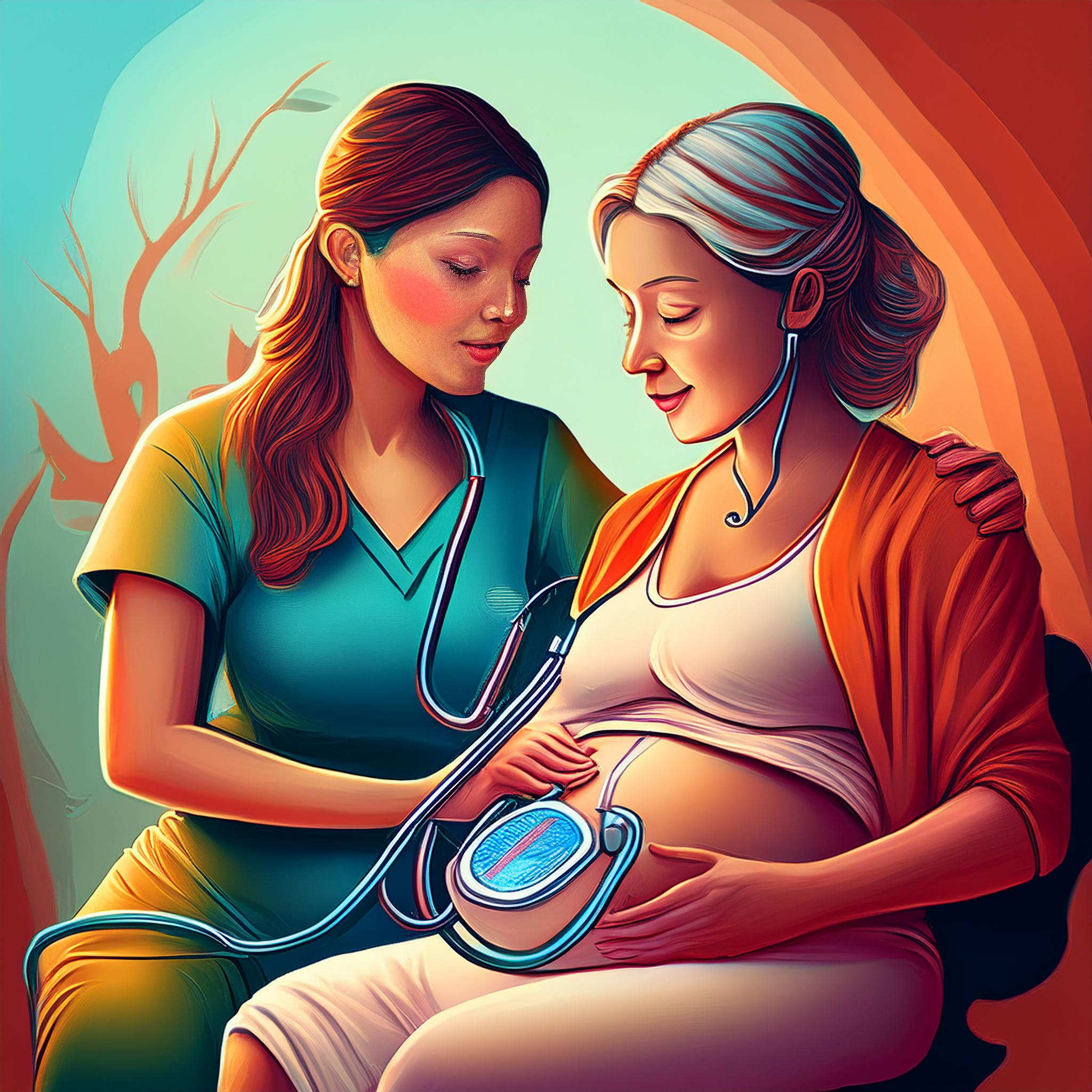What Makes Woman Afraid of Their Childbirth?: A Qualitative Study
Downloads
Fear generally fills the minds of pregnant women as they enter the third trimester of gestation. The older the gestational age, the more attention and thoughts of pregnant women are drawn to the approaching climax of childbirth, intensifying their anxiety and fear. This study aimed to assess the knowledge of birth preparedness and fear of childbirth. A qualitative facility-based descriptive study design and client exit interview questionnaire were utilized, conducted in Primary Health Care Mondokan, Sragen, from April until June 2023 with 33 pregnant women. Study participants were selected through purposive sampling. Three categories highlighted the preparedness for childbirth, including finding primary sources of information, the importance of birth companions, and reminding about the natural process of childbirth. The fear of childbirth was associated with fear of the childbirth process, fear of the tools used during childbirth, and the condition of the unborn baby. The findings suggest that pregnant women should prepare for childbirth and increase their knowledge of delivery by participating in antenatal classes to reduce fear about the childbirth process. Therefore, family healthcare providers, health facilities, other partners, program-level managers, and policymakers must take responsibility for improving health education and increasing preparedness and complication readiness through easily accessible health education strategies.
Adams, S., Eberhard-Gran, M., & Eskild, A. (2012). Fear of childbirth and duration of labour: a study of 2206 women with intended vaginal delivery. BJOG: An International Journal of Obstetrics & Gynaecology, 119(10), 1238–1246. doi:10.1111/j.1471-0528.2012.03433.x
Downe, S., Finlayson, K., Tunçalp, Ӧ, & Metin Gülmezoglu, A. (2015). What matters to women: a systematic scoping review to identify the processes and outcomes of antenatal care provision that are important to healthy pregnant women. BJOG: An International Journal of Obstetrics & Gynaecology, 123(4), 529–539. doi:10.1111/1471-0528.13819
JHPIEGO. Monitoring birth preparedness and complication readiness tool and indicator for maternal and new born care. Matern Neonatal Health Program. 2009:21231–3492 USA (www.jhpiego.org).
Hidayat S, Sumarni S. (2016). Kecemasan ibu hamil dalam menghadapi proses persalinan. Jurnal Wiraraja Medika; Madura.
Kaso M, Addisse M. Birth preparedness and complication readiness in Robe Woreda, Arsi Zone, Oromia Region, Central Ethiopia: a cross-sectional study. Reprod Health. 2014:1–12.
Kızılırmak, A., & Başer, M. (2016). The effect of education given to primigravida women on fear of childbirth. Applied Nursing Research, 29, 19–24. doi:10.1016/j.apnr.2015.04.002
M’soka, N. C., Mabuza, L. H., & Pretorius, D. (2015). Cultural and health beliefs of pregnant women in Zambia regarding pregnancy and child birth. Curationis, 38(1). doi:10.4102/curationis.v38i1.1232
Meedya, S., Win, K., Yeatman, H., Fahy, K., Walton, K., Burgess, L., McGregor, D., Shojaei, P. S., Wheatley, E., & Halcomb, E. (2020). Developing and testing a mobile application for breastfeeding sup- port: The Milky Way application. Women and Birth. https://doi. org/10.1016/j.wombi.2020.02.006
Ministry of Health Indonesia. Profil Kesehatan Indonesia 2018 [Indonesia Health Profile 2018]. (2019).
Munkhondya, B. M. J., Munkhondya, T. E., Msiska, G., Kabuluzi, E., Yao, J., & Wang, H. (2020). A qualitative study of childbirth fear and preparation among primigravid women: The blind spot of antenatal care in Lilongwe, Malawi. International Journal of Nursing Sciences, 7(3), 303–312. doi:10.1016/j.ijnss.2020.05.003
Naha, M., & Handayani, S. (2020). Hubungan Pengetahuan Ibu Hamil tentang Persalinan dengan Kesiapan Menghadapi Persalinan pada Trimester III di Puskesmas Umbulharjo I Yogyakarta. Jurnal Kesehatan Samodra Ilmu, 9(2), 158-168
Pantiawati, Ika. 2016. Asuhan Kebidanan I (Kehamilan). Yogyakarta: Nuha Medika.
Pinar, G., Avsar, F., & Aslantekin, F. (2018). Evaluation of the impact of childbirth education classes in Turkey on adaptation to pregnancy process, concerns about birth, rate of vaginal birth, and adaptation to maternity: A case-control study. CNR, 27(3), 315–342. https://doi. org/10.1177/1054773816682331
Sanders, R. A., & Crozier, K. (2018). How do informal information sources influence women’s decision-making for birth? A meta-synthesis of qualitative studies. BMC Pregnancy and Childbirth, 18(1). doi:10.1186/s12884-017-1648-2
Syada S, Ramaida, Ramaida. (2017). Pengaruh Hypnobirthing terhadap Kala I pada Ibu Bersalin di Klinik Pratama Mulia Medica Desa Sungai Buluh Kecamatan Singingi Hilir Kabupaten Singingi Tahun 2015. Jurnal Endurance. Hal 15. Vol 2.
Copyright (c) 2024 JURNAL INFO KESEHATAN

This work is licensed under a Creative Commons Attribution-NonCommercial-ShareAlike 4.0 International License.
Copyright notice
Ownership of copyright
The copyright in this website and the material on this website (including without limitation the text, computer code, artwork, photographs, images, music, audio material, video material and audio-visual material on this website) is owned by JURNAL INFO KESEHATAN and its licensors.
Copyright license
JURNAL INFO KESEHATAN grants to you a worldwide non-exclusive royalty-free revocable license to:
- view this website and the material on this website on a computer or mobile device via a web browser;
- copy and store this website and the material on this website in your web browser cache memory; and
- print pages from this website for your use.
- All articles published by JURNAL INFO KESEHATAN are licensed under the Creative Commons Attribution 4.0 International License. This permits anyone to copy, redistribute, remix, transmit and adapt the work provided the original work and source is appropriately cited.
JURNAL INFO KESEHATAN does not grant you any other rights in relation to this website or the material on this website. In other words, all other rights are reserved.
For the avoidance of doubt, you must not adapt, edit, change, transform, publish, republish, distribute, redistribute, broadcast, rebroadcast or show or play in public this website or the material on this website (in any form or media) without appropriately and conspicuously citing the original work and source or JURNAL INFO KESEHATAN prior written permission.
Permissions
You may request permission to use the copyright materials on this website by writing to jurnalinfokesehatan@gmail.com.
Enforcement of copyright
JURNAL INFO KESEHATAN takes the protection of its copyright very seriously.
If JURNAL INFO KESEHATAN discovers that you have used its copyright materials in contravention of the license above, JURNAL INFO KESEHATAN may bring legal proceedings against you seeking monetary damages and an injunction to stop you using those materials. You could also be ordered to pay legal costs.
If you become aware of any use of JURNAL INFO KESEHATAN copyright materials that contravenes or may contravene the license above, please report this by email to jurnalinfokesehatan@gmail.com
Infringing material
If you become aware of any material on the website that you believe infringes your or any other person's copyright, please report this by email to jurnalinfokesehatan@gmail.com.





























